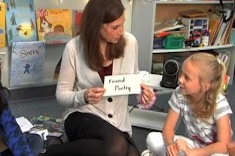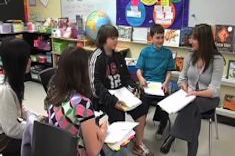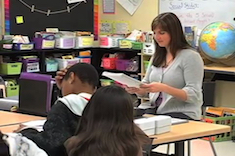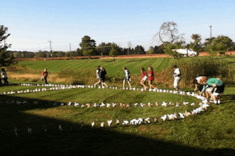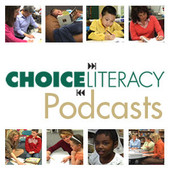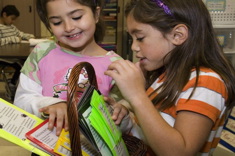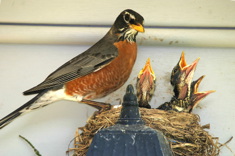Poetry
We all need more poetry in our lives, and time spent with poems in classrooms is what many students carry away and cherish years after they've left our schools. Here are resources to help you bring more of the delights of poetry into your classroom and school.
Latest Content
Poetry Friday in the Computer Lab
Mary Lee Hahn provides a wealth of web resources and practical suggestions for using technology for poetry instruction.
Poems Facing Art: Ekphrasis
Shirl McPhillips considers ekphrasis (poetry inspired by art) in her own poetry and reflection.
Poetry All Year Long
Ann Williams shares how she builds a love of poetry in her fourth-grade classroom all year long.
Lines Written at Lunchtime Above Tintern Abbey
Shirl McPhillips celebrates high summer, friendship, and handwritten notes in this poem and reflection.
Found Poetry in Second Grade
Linda Karamatic teaches a small group of her second graders about found poetry.
Guiding Groups in Middle School: Reading Poetry
Katie Doherty works with a small group of sixth graders who need extra support as they read the poem “Aspects of Autumn.”
Same Old Love Song — A Cento
Shirl McPhillips creates a cento – a collection of lines written by other poets compiled into a new poem. It turns out poets were sampling other creative works centuries before rappers made the practice so popular today.
From “I Don’t Get It” to “Never Mind — That’s Amazing!”: Scaffolding Schema for Comprehending Poetry
Katie Doherty finds poetry is a powerful tool for helping her middle school students understand the value of schema while reading.
Poetry that Celebrates Summertime and the Outdoors
Franki Sibberson combines verse and nature in this booklist on taking poetry outdoors.
Pitching My Lesson Plans for a Day of Peace and Poetry
Seizing an unexpected learning opportunity may be the best way to remember why you became a teacher in the first place. Karen Terlecky celebrates one of these serendipitous moments.
Invocation at the End of Summer
Shirl McPhillips reminds us of the power of an invocation–a call for support. Not only is this a beautiful poem, but it is a model for students writing their own invocation.
Teaching Poetry to Teens with the William Stafford Archives
Erin Ocon highlights the life and work of William Stafford and how she uses the archives of his work to bring poetry alive for her middle school students.
Georgia Heard on the Common Core (PODCAST)
In this podcast, Georgia Heard talks about the possibilities for the Common Core when teachers bring their own passion, heart and poetry to the discussions.
Improving Poetry’s Rap
Katie Baydo-Reed finds the web has great resources for her middle school students when it comes to sparking more interest in poetry.
A Poetry Cafe Celebration
Stella Villalba explains how her poetry cafe program brings families together for a festive event, and helps English language learners develop reading and fluency skills at the same time. This is the first installment in a two-part series.
An ESL Poetry Cafe Celebration (Part II)
Stella Villalba explains how her Poetry Cafe program brings families together for a festive event, and helps English language learners develop reading and fluency skills at the same time. This is the second installment in a two-part series.
Poetry Fridays (and So Much More) for Students and Staff
 Mary Lee Hahn finds Poetry Fridays are about so much more than poetry, or even a pleasant end to the week. She shares how this activity is a wonderful way to bring together colleagues and students.
Harbinger
Shirley McPhillips draws parallels between a tentative, battered robin in the snow and the fragility of teachers in the spring.
Poetry Possibilities
Shari Frost shares literacy activity suggestions and a booklist of her favorite poetry anthologies.
Books that Invite Students into Poetry Writing
Are your students stuck on writing poems that rhyme? Franki Sibberson shares some of her favorite mentor texts for lifting the quality of student poems.
New Books to Celebrate Poetry
Franki Sibberson shares some of her favorite new poetry collections in an annotated booklist.
Lady With the Yellow Umbrella
In this poem, Shirl McPhillips writes about "learning better how to live" while finding peace and purpose in the midst of adversity.
An Uncommon Place
A mulberry tree crashes during a blizzard, creating a surprisingly lovely mental space for Shirl McPhillips to craft her poem.
Revising Titles Minilesson
In this minilesson from Franki Sibberson’s grades 3 and 4 classroom, Franki takes students through the process of selecting and revising titles. She uses the poem “Confessions of a Reader” by Carol Wilcox as a mentor text.
Life on the Edge
"Life on the Edge" compares the energy and purpose of birds in a nest to daily life in classrooms. It's the perfect metaphor for the fast pace of our teaching lives.
Now is Our Season
Shirl McPhillips so eloquently captures the spirit of the light and dark, hopeful and ambivalent, quiet and purposeful time after the holidays in this poem.
Along Saplines
A poem and reflection to lift your spirits if you have the late-winter blues.
If We Could Meet Again
Shirl McPhillips captures perfectly the "shaking off the old classroom skin" feel of the start of the summer. Shirley's commentary encourages teachers to use time away from students "to break out, free up, go someplace, and cast off the trappings."
Cap’n George: Mentors Who Matter
Shirley McPhillips finds the mentoring that helps her most as a poet includes principles that are useful in any teaching situation.
What Happens Next
"What Happens Next" from Shirl McPhillips is a poem celebrating the renewal that comes when spring finally arrives – a perfect metaphor for the different seasons of the school year.
Browse Content By
Type
Category
- Assessment Tools
- Big Fresh Archives
- Booklists
- Choice Numeracy
- Classroom Design
- Common Core
- Community Building
- Conferring
- Content Literacy
- Digital Literacy
- English Language Learners
- Equity
- Family Relations
- Free Samples
- Guiding Groups
- Leadership
- Literacy Coaches
- Mentor Texts
- Minilessons
- New Teacher Mentors
- Podcasts
- Poetry
- Quote Collections
- Reading Strategies
- Self Care
- Struggling and Striving Learners
- Talking and Listening
- Teacher Study Groups
- Teaching Reading
- Teaching Writing
- Word Study and Vocabulary
Author
- Melissa Quimby
- Nawal Qarooni
- Gwen Blumberg
- Julie Cox
- The Lead Learners
- Hannah Tills
- Josie Stewart
- Ruth Metcalfe
- Mallory Messenger
- Becca Burk
- Jodie Bailey
- Vivian Chen
- Mary Brower
- Tiffany Abbott Fuller
- Stephanie Affinito
- Ruth Ayres
- Leigh Anne Eck
- Heather Fisher
- Shari Frost
- Julie Johnson
- Suzy Kaback
- Gigi McAllister
- Shirl McPhillips
- Melanie Meehan
- Cathy Mere
- Debbie Miller
- Tara Barnett and Kate Mills
- Tammy Mulligan
- Dana Murphy
- Bitsy Parks
- David Pittman
- Brenda Power
- Heather Rader
- Matt Renwick
- Mandy Robek
- Christy Rush-Levine
- Gretchen Schroeder
- Jen Schwanke
- Brian Sepe
- Katherine Sokolowski
- Stella Villalba
- Jennifer Vincent
Grade Level
Choice Literacy Membership
Articles
Get full access to all Choice Literacy article content
Videos
Get full access to all Choice Literacy video content
Courses
Access Choice Literacy course curriculum and training





